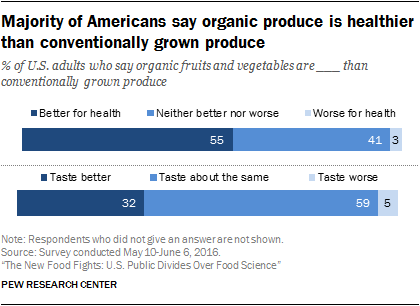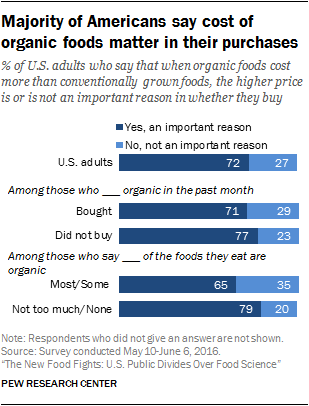
Americans’ appetite for organic foods has grown steadily over the past few decades. According to the Economic Research Service, retail sales of organic foods more than doubled from 1994 to 2014 with a steady uptick of about 10% annual growth in retail sales over the past several years.13 Almost surely, a driver of this trend is people’s health concerns. Most Americans believe organic produce is better for one’s health than conventionally grown produce. Whether the science lines up behind this belief is less clear. Organic farming typically eliminates the use of conventional pesticides and fertilizers and, as a result, organic fruits, vegetables and grains have substantially lower levels of pesticides. At least one recent meta-analysis, reviewing the results of more than 340 studies, found that on average, organic foods also have higher levels of antioxidants. But having more antioxidants is not sufficient for foods to be more nutritious and there is considerable scientific debate over whether organic foods provide a nutritional boost when compared with eating conventionally grown foods.14
A majority of Americans purchased organic food in the past month and many buy foods based on the labeling

How do Americans’ food and eating orientations play out in the grocery aisles? Some 73% of Americans say they bought locally grown fruits and vegetables in the past month. A similar share (71%) made purchasing decisions based on nutrition and ingredients labels. And, some 68% of Americans bought organic foods of some kind, whether produce, meat, fish, grains or packaged foods.
Some 44% of Americans say they bought food labeled as having no genetically modified organisms (GMO) – or GMO-free. About a quarter (28%) say they did not do this and another 27% are not sure if they bought GMO-free food in the past month. (Note that references to GM, genetically engineered and GMO foods are synonymous in this report.)
The European Union and other places around the world have long required mandatory labeling of food products with GM ingredients. Voluntary labeling of GMO-free foods became more common in the U.S. starting around 2009 when the largest purveyor of natural foods began requiring verification and labeling of their house-brand products as non-GMO.15 In July 2016, Congress passed a bill to establish national standards for labeling food containing genetically engineered modified ingredients. It is expected to be another two years before these labeling standards are fully in effect, however.

People’s food ideologies are closely connected with their food-purchasing habits. For example, those who care a great deal about the issue of GM foods are more likely to make buying decisions based on the nutrition and ingredient label; 89% have done this in the past month compared with 57% of those who do not care too much or at all about the issue of GM foods. Similarly, 89% of those focused on eating healthy and nutritious have chosen food products based on the nutrition and ingredient label at least once in the past month. About half (54%) of those not too or not at all focused on eating healthy and nutritious have done this in the past month.
People’s food philosophies are also closely connected to purchases of organic foods and foods labeled GMO-free. People who care a great deal about the issue of GM foods are particularly likely to have bought organic foods and foods labeled GMO-free in the past month. Similarly, people focused on eating healthy and nutritious are more likely those who are not at all or not too focused on eating healthy and nutritious to have purchased organic foods at least once in the past month and to have bought food labeled GMO-free.

Overall, how much organic food do people eat? Four-in-ten Americans say that some (34%) or most (6%) of the food they eat is organic. Some 15% of Americans say that none of the food they eat is organic and 44% say not too much of what they eat is organic.
Food purchasing behavior maps with overall consumption of organics and with people’s food ideologies. About half of those who bought organic foods within the past month say that most (9%) or some (45%) of what they eat is organic. Although four-in-ten people who bought organic foods in the past month say that, overall, not too much of what they eat is organic.
Fully 76% of those deeply concerned about the issue of GM foods say at least some of what they eat is organic. By contrast, just 22% of those with little/no concern about the issue of GM foods say at least some of what they eat is organic, 54% say not too much of what they eat is organic and 22% say none of what they eat is organic.
There is a similar pattern among those focused on eating healthy and nutritious; 63% among this group say at least some of what they eat is organic, compared with 22% of those not too or not at all focused on eating healthy and nutritious.
American shoppers are looking for healthy foods when they head for the organic aisles

Most Americans are buying organic foods because of health concerns. More than half (55%) of the public says that organic fruits and vegetables are better for one’s health than conventionally grown produce. Another 41% say organic produce is neither better nor worse for one’s health and 3% say that organic produce is worse for one’s health.
Three-quarters of U.S. adults who bought organic foods in the past month (76%) say they were looking for healthier foods. Fewer organic food consumers say that helping the environment (33%) or convenience (22%) were reasons for buying organic.
But fewer Americans say organic produce tastes better than conventionally grown fruits and vegetables. About one-third of U.S. adults (32%) say that organic produce tastes better, 5% say it tastes worse and a 59% majority says that organic and conventionally grown produce taste about the same.

Younger adults, ages 18 to 49, are more inclined than older adults to consider organic produce better for one’s health. There are no differences among men and women on views of the healthfulness of organic foods.
Fully three-quarters (75%) of people who consume more organic foods, that is those who say that most or some of the foods they eat are organic, believe that organic produce is generally better for one’s health than other produce. This compares with 41% of those who eat less organic foods.
A similar pattern is found among those focused on food issues. Fully 81% of those who care a great deal about the issue of GM foods say that organic produce is a boon to health, compared with 35% of those who do not care at all or not too much about this issue. A 62% majority of those focused on eating healthy and nutritious says that organic produce is better for one’s health. Those who are not too or not at all focused on eating healthy and nutritious are less convinced that organic produce has health benefits: 46% say they do, while 49% say organic produce is no different than conventionally grown produce.
Fewer people see a taste advantage for organic produce. Overall, 59% of Americans say that organic produce tastes about the same as conventionally grown produce.
But people who eat more organic foods are comparatively more inclined to say they taste better. About half (51%) of those who say most or some of what they eat are organic foods say that organic produce tastes better, 45% say organic produce tastes about the same. By comparison, fully 71% of those who do not eat organic foods at all or not too much say that fruits and vegetables grown organically taste about the same as other foods, a fifth (20%) say organic foods taste better.

The Pew Research Center survey also finds that health concerns are a key reason people purchase organic foods. Among those who bought organic foods in the past month, 76% say a reason was to get healthier foods. Fewer say that either convenience (22%) or environmental concerns (33%) were reasons for their purchases of organic foods.
Both frequent and infrequent consumers of organic foods say that a desire for healthier foods was a reason they purchased organic foods recently.
Consumers care about cost, too, and whether it is easy to find organic foods

Cost considerations come into play as well. Roughly seven-in-ten (72%) U.S. adults say whether or not they buy organic foods depends on the price compared to conventionally grown foods.
Even frequent consumers of organic foods say they are cost sensitive. About two-thirds (65%) of people who eat more organic foods say the comparative cost of organic foods factors into their purchasing decisions, as do 79% of people who eat less organic foods.

Availability could also affect how often people buy organic foods. One-third of Americans say that it is very easy to find organic foods in their local communities. Another 48% say they are easy to find. A minority, 18%, say organic foods are hard or very hard to find in their local communities. Americans living in rural areas are less likely than those in urban or suburban areas to say that organic foods are very easy to find. But overall, some (66%) of rural-dwelling Americans say it is easy or very easy to find organic foods in their communities. This compares with 84% of those in urban areas and 85% of those in suburban areas.
There are modest differences in ease of finding organic foods between those who purchased these foods in the past month and those who have not. And a majority of people who are heavier consumers of organic foods, say, overall finding organic foods in their communities is easy or very easy.




